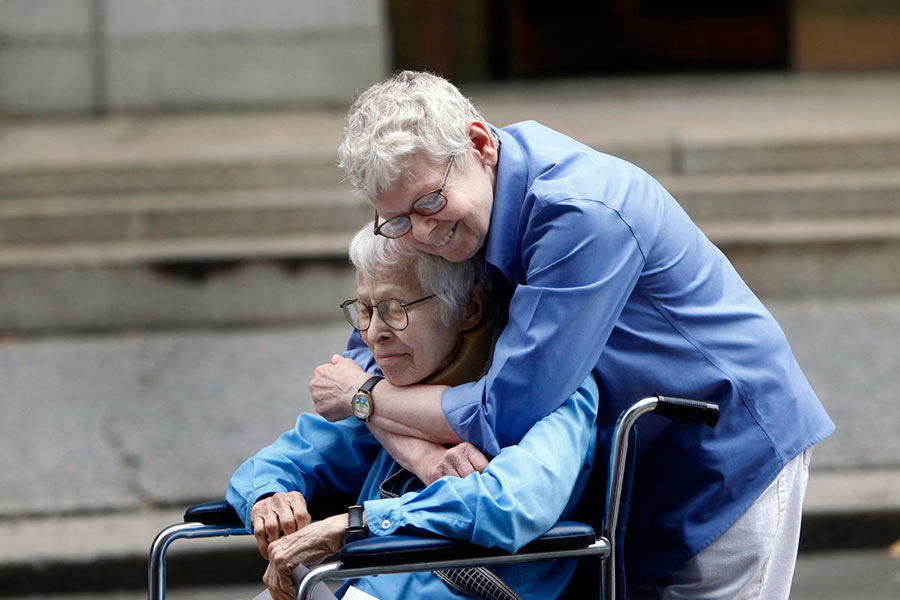Twenty-five years ago, Congress passed, and President George H. W. Bush signed into law, the Americans with Disabilities Act of 1990. The ADA was designed to end discrimination against people with disabilities. The law has been challenged by opponents, interpreted by the courts and revised by Congress to clarify its intent and expand its coverage. Today, it stands as one of the highest forms of civil-rights legislation ever passed for people with disabilities in the United States.
To help understand the impact of the ADA on the ability of LGBT older adults and people with disabilities to live independently as we age, the LGBT Elder Initiative spoke with one of Philadelphia’s outstanding disability-rights leaders, Thomas Earle, the chairperson of the Philadelphia Commission on Human Relations, and CEO of Liberty Resources, Inc. (LRI), Philadelphia’s federally designated Center for Independent Living.
LGBTEI: What were the three most impactful changes brought about by the ADA?
TE: First, the ADA protected people with disabilities from employment discrimination by private and public employers. For the first time in this country, people with disabilities were able to apply for jobs that they previously would never have had a chance of getting. Second, employers had an affirmative duty to accommodate their employees with disabilities so they could more efficiently do their jobs — things like assistive technology and other equipment, basic access to facilities, alternative format materials and sign-language interpreters are just a few simple examples. Third, private businesses were required to become accessible to people with mobility impairments, including those using wheelchairs. Retail businesses, museums, movie theaters, restaurants, the whole gamut of places of public accommodation that able-bodied people routinely visit and use, were now required to remove architectural barriers so that people with disabilities could go there.
LGBTEI: How has the ADA enabled older adults to live independently?
TE: Philadelphia and Pennsylvania have among the largest populations of seniors in the country. As people live longer, many acquire age-related disabilities, such as osteoporosis, arthritis, diabetes and vision loss. These people are also working longer, well into their older years. It is not uncommon now to see folks in their mid-60s and 70s seeking employment opportunities. Here at LRI, we just had a person apply for a job at 72. Under the ADA, people who want to stay active in the community and work longer are protected. The ADA has advanced the inclusion of people with disabilities into society through its important community-integration mandate.
LGBTEI: What other benefits have resulted from the ADA?
TE: We have seen that the ADA aids people who are older with the improved accessibility of our mass-transit system; fixed bus routes, Regional Rail or the El, many of SEPTA’s transportation options have improved under the ADA. Other significant improvements resulted from the “Curb-Cut Case,” which was based in Philadelphia. Ed Rendell, who was then mayor, challenged the ADA as an unfunded mandate. Our disabled community protested and rallied and a case was filed against the mayor and the city that said that, as the city resurfaced its streets, part of that work should also include putting in curb-cuts. The court agreed that the time to make an accessible feature is when you are in the middle of constructing something. Higher courts agreed and this interpretation of the ADA set a precedent for the country. Those curb-cuts we now see everywhere benefit many people today — seniors, people with baby strollers, delivery people, you name it.
LGBTEI: Studies show LGBT people fear discrimination and abuse in nursing homes or institutional, longterm-care settings. How can older adults and people with disabilities avoid institutional care and remain in their own homes and communities?
TE: LRI and other advocacy organizations are trying to help the government, at all levels, refocus funding from institutional care to community-based, in-home care. For consumers, knowledge is power and older adults and people with disabilities need to be aware of what their community-based options are. Not everybody knows that there are alternatives to expensive and unnecessary nursing-facility placement. Right now in the United States, and Pennsylvania is no exception, the Medicaid-funded longterm-care system has what is called an “institutional bias.” Federal dollars have been used to automatically support someone’s entry into a nursing facility. This is done even though, for the past 15 years or so, there have been a growing number of community-based options for longterm care. These options exist throughout the city. Older residents with disabilities, including members of the LGBTQ communities, can receive services in community-based settings. Nursing-home care is very expensive and typically unnecessary and undesirable. Our statistics show that Philadelphia and other parts of Pennsylvania have the ability to serve up to three people in community-based settings for every one person we pay for to live in a nursing facility. The economics support what many older Americans actually want: to live longer, independently, in their own homes and communities.
LGBTEI: What should older adults and people with disabilities advocate for so we can live independently as we age?
TE: The need for affordable, accessible housing is critical in Philadelphia and impacts many different groups of people. Recent studies have shown that the city’s stock of rental housing is becoming unaffordable to the majority of working families, seniors and people with disabilities. It is important for the city and its community-development work to carefully ensure that, as development takes place, it is done in a way that does not displace longtime residents, including seniors. Our older adults must have the ability to live in the neighborhoods that they want to live in, and not be priced out of those areas. That is a huge undertaking. LRI and the Philadelphia Coalition on Affordable Communities are working to increase funding into the Housing Trust Fund so affordable housing for seniors and people with disabilities will continue to be developed throughout all of Philadelphia.
